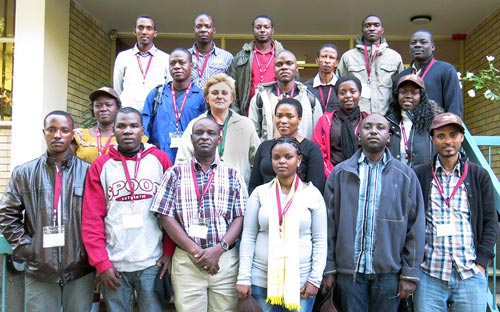 Fifteen young scientists from SIMLESA partner and spillover countries were recently trained by the Agricultural Research Council of South Africa (ARC-SA) on various aspects of agronomy and innovation learning platforms (ILePs), including conservation agriculture principles, nitrogen fixation, experimental design and field layout, agro-climatology principles, and data collection and analysis.
Fifteen young scientists from SIMLESA partner and spillover countries were recently trained by the Agricultural Research Council of South Africa (ARC-SA) on various aspects of agronomy and innovation learning platforms (ILePs), including conservation agriculture principles, nitrogen fixation, experimental design and field layout, agro-climatology principles, and data collection and analysis.
The training took place during 06-17 May 2013 at three ARC institutes: Institute for Soil, Climate and Water (ARC-ISCW), Plant Protection Research Institute (ARC-PPRI), and Grain Crops Institute (ARC-GCI), and aimed to expose the scientists to grain production information and to enable assimilation of terms, theories, and principles through practice. The training was based on experiential learning principles and employed a variety of interactive learning methods, scientific presentations, discussions, multiple practical sessions in the laboratory, and field demonstrations.
During field visits, such as the one to SOYGRO, a company manufacturing rhizobium inoculant and related products, trainees got to experience how the grain industry functions in South Africa from manufacturing and packing to the distribution processes.
Trainees also visited the NAMPO Harvest Day in Bothaville, Free State, taking place during the NAMPO Agricultural Trade Show, one of the largest privately organized and owned exhibitions in the world and the largest agricultural machinery and livestock show in the Southern Hemisphere. The show draws more than 650 exhibitors each year from all over the world, including Australia, Sweden, the USA, Italy, Brazil, and Germany. Another visit on the program was to the Unit of Environmental Sciences and Management at the North-West University, where Professor Driekie Fourie introduced the trainees to the University research programs and related study fields. Before the trip, Professor Johnny van den Berg from the University had given an introductory talk on integrated pest management.
The program was coordinated by CIMMYT agronomist Fred Kanampiu, Yolisa Pakela-Jezile from ARC-CO, and Annelie de Beer from ARC-GCI. Participants are expected to use their newly acquired knowledge and skills to train their colleagues.
Under the Memorandum of Understanding between ARC and CIMMYT under SIMLESA, ARC is responsible for organizing capacity building of scientists and extension officers in the five target countries (Ethiopia, Kenya, Malawi, Mozambique, and Tanzania) and the seven spillover countries (Uganda, Botswana, Rwanda, and South Sudan). SIMLESA is funded by the Australian government through ACIAR.
 Capacity development
Capacity development